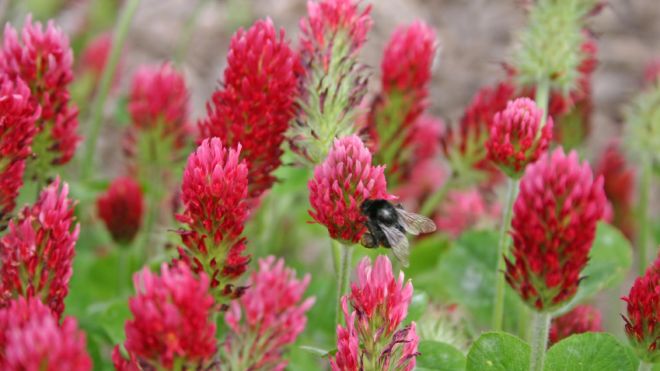
Every year, a beautiful crop of red clover spontaneously matures on my lawn. For a few weeks, the dark pink tops adorn the yard. I always look forward to the blooming of red clover, and I take advantage of the bumper crop in my yard by picking some and drying it for herbal tea. Originating from Europe, northern Asia and Africa, red clover is broadly distributed throughout the United Sates. As a fodder crop red clover is cultivated for animals, and the plant benefits soil by fixing nitrogen, thereby making it an ideal cover crop for enriching soil fertility for other crops. In the U.S., red clover is the state flower of pastoral Vermont. The use of red clover as an herbal remedy goes back centuries, and the plant enjoys a history of both topical and internal applications. As a topical aid, red clover is often an ingredient in liniments and balms, for relieving the pain of both eczema and psoriasis, for sores, burns, and as an aid against skin cancer. The pain-relieving properties of red clover are likely due to the presence of the anti-inflammatory compounds eugenol, myricetin and salicylic acid in the flowers. Salicylic acid also demonstrates activity against eczema. Red clover has long been used as a “blood purifier,” specifically for the potential treatment of cancer. The flower is a mainstay ingredient in traditional herbal formulas, including Essiac Tea, Jason Winters Tea, and the Hoxsey Therapy. In the best selling herbal classic Back to Eden, author Jethro Kloss declares red clover as a life-saving anti-cancer remedy. Proponents of these therapies claim a multitude of successes, while various health agencies including the FDA and the American Cancer Society declare these same formulas to be of no value. In red clover blossoms, the compounds biochanin-A, caffeic acid, chlorogenic acid, coumarin, formononetin, genistein and isorhamnetin all demonstrate some anti-cancer properties, according to various published studies. So the truth of red clover’s possible value for treating cancer likely lies between the positions of advocates and critics. One thing is certain: Red clover is a blood thinner. This is due to the concentration of coumarin found in the blossoms. For cases of thrombosis and other conditions in which thick blood obstructs vessels, red clover tea may be of benefit. However, for those who are taking blood-thinning medications, adding red clover to the mix can be a bad idea. Prior to surgery, drinking red clover is not recommended, as doing so may exacerbate surgical bleeding. Because of its concentration of the phytoestrogens daidzein and genistein, which mimic the activity of estrogen, red clover has been studied for its use in alleviating the discomfort of menopause. In one study reported in the Journal of the American Medical Association, the red clover-based product Promensil showed slightly better activity than a placebo for the relief of hot flashes – but overall the results were underwhelming. In general, red clover has not proven especially effective for menopausal discomfort. The same presence of phytoestrogens – plant compounds that mimic estrogen – has led many doctors to warn against using red clover preparations if women have had reproductive health disorders including endometriosis, uterine fibroids, or breast and uterine cancers. The concern is that the phytoestrogens may increase rather than alleviate these conditions. As a gentle cleansing tea drunk on occasion for overall salutary purposes, red clover appears to offer many benefits to health. High in natural protective antioxidants and anti-inflammatory compounds – and pleasant in flavor – red clover is good for general health, and is a tasty beverage. Rather than buying red clover tea in a store, just harvest a little from your lawn. Dry it on some newspaper for a few days, and you have red clover herbal tea, ready to go.Chris Kilham is a medicine hunter who researches natural remedies all over the world, from the Amazon to Siberia. He teaches ethnobotany at the University of Massachusetts Amherst, where he is Explorer In Residence. Chris advises herbal, cosmetic and pharmaceutical companies and is a regular guest on radio and TV programs worldwide. His field research is largely sponsored by Naturex of Avignon, France. Read more at& MedicineHunter.com.source : http://www.foxnews.com/health/2013/06/12/healing-properties-red-clover/

